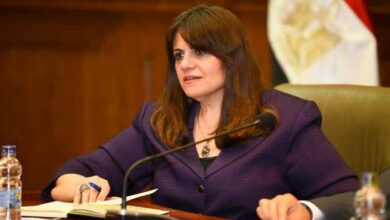In the following interview, Minister of Tourism Zoheir Garana discusses tourism-generated employment as well as recent legislative alterations for the industry.
Al-Masry Al-Youm: Has the Tourism Development Authority registered all its affiliated lands?
Zoheir Garana: Neither the authority nor the ministry were requested to register lands. Both of them are part of a council that sets the rules of dealing with the state lands. At this point, we don’t mean the tourism authority only, but all lands affiliated with other different sectors like the Industrial Development Authority, the New ِUrban Communities Authority and others. All will be dealt with in the same way after an agreement is reached among all sectors. It will then be reviewed by the president. Then a law will be issued based on this agreement.
Al-Masry: Does this means there will be an apparatus to deal with state lands?
Garana: No, but there will be a clear policy that handles the state land issue.
Al-Masry: Development always has different requirements that range between industrial, agricultural, tourism and others. How will you deal with this issue with one system?
Garana: The principle of disposition will be the only policy, but technically, every sector will achieve it in its own way.
Al-Masry: As a tourism expert, how can this system be developed?
Garana: From my own point of view, easier dealings within fields of development and more investor attractions will lead to positive results for the state and budget. There should be a transparent policy.
Al-Masry: Selling lands at development prices always raise questions due to the large areas of lands. Investors assert some countries allocate lands for free. What do you think?
Garana: People don’t count costs of investment. For this point, we are not talking about a person who became an investor because he bought a piece of land. Land ownership created job opportunities as well as new housing projects, all this for free. Secondly, concerning the idea of selling one meter at one dollar, investors didn’t want to work at these far areas. So they were motivated by ways like tax exemption for 10 years and others. Back to lands which were sold at LE2.4 per meter, owners of hotels and buildings established over these lands pay more than LE10 for taxes. It created job opportunities that is worth LE100,000. Some people think selling at development prices is harmful for state’s economy, but we, as the government, think we’re asked to provide 650,000 job opportunities. If it hadn’t been for this policy, we wouldn’t have created these job opportunities.
Al-Masry: How many job opportunities are created by the tourism sector?
Garana: It provides more 200,000 job opportunities. According to current tourism rates, we can provide more.
Al-Masry: You announced that the tourism sector achieved the president’s electoral platform before its deadline. Why do you fear a financial crisis involving the tourism industry?
Garana: Our success is a result. Tourism is a very sensitive industry. I always have fears because there’s competition among countries. If we don’t deal with tourism as if we’re in danger, we’ll lose.
Al-Masry: Investors in Sinai always complain about ownership when it comes to national security, whereas the problem is that banks refuse to finance them. What do you think?
Garana: These complaints are untrue. Banks in Sinai have investments worth millions of pounds. They do finance projects of economic profits, but they don’t finance investors that are not serious.
Al-Masry: But according to investors, the banks refuse to fund usufruct.
Garana: The main problem is that banking services do not have this policy of usufruct and the notary does not have such a system. However, the Ministry of Justice is currently studying this issue so that in the future banks can fund usufruct.
Al-Masry: In your opinion do the regulations controlling allocation of land need any amendments when it comes to the matter of withdrawal of land?
Garana: The government does not stand behind people with a whip but it stands behind the serious investor wishing to help him. No benefit will come from shooting down an investor that has a problem instead of helping him.
Al-Masry: How do you deal with major NDP investors who delay the implementation of their projects?
Garana: The Minister of Tourism's role is to put policies in place and if a serious investor has a problem I will stand behind him as serious investors, whether Egyptian or foreign, and as a rare commodity. I must look after them in conformance with the governing laws.
Al-Masry: There is now an agreement between Iran and Egypt concerning air transportation and an expected future agreement in the area of tourism. Do we have any studies concerning the Iranian market?
Garana: I heard about this agreement but I am not aware of the details.
Al-Masry: As a tourism expert what is your take on the Iranian market?
Garana: Before any studies are made, there are certain issues that must first be resolved, especially since no one knows if such issues will be resolved. Nonetheless, we have studies on any market in the world in case any market becomes open to us.
Al-Masry: Does this mean that Egypt could begin collaboration with Tehran?
Garana: Collaborations are governed by political, social, cultural and tourism policies and relations. Tourism from Nile Basin Countries is low although tourism is one of the sectors that have the potential to assist Egypt in the Nile issue. These countries have small-scale movement patterns and a large number of these countries were occupied by other countries and the relations they have with the countries that previously occupied them make them prefer to travel to those countries.
Al-Masry: Do you expect Egypt will allow tourists from neighboring countries to enter without issuing a visa as other countries in the region have done to attract more tourists?
Garana: When such agreements are made between two countries, this must be discussed at both the political and security levels. Citizens of certain countries, such as European countries, can enter into Egypt with their national ID card and it is a possibility that similar agreements may be made with other countries as well.
Al-Masry: How much do the Israeli warnings against tourism to Egypt affect tourism from countries such as the US and Europe?
Garana: These are attempts to scare people away. However, people all over the world know when to take such warnings seriously and when to ignore them. The Israeli warnings always come in accordance with holidays and travel movements. This is a pattern seen in many countries who warn their citizens so that in the case that something does happen they can say they warned them.
Al-Masry: What is your take on the phenomenon of ministers that double as businessmen?
Garana: Society is the judge on such an issue, one cannot opine on ones own success or failure.
Al-Masry: Would you say that Zuhair Garana is a success or a failure?
Garana: There is no success or failure in this matter. I was a normal person that became a politician and a minister in a big country and this in itself is huge. The real success in this matter is that you gain a lot of experience, knowledge and a new way of thinking.
Al-Masry: How did your way of thinking change?
Garana: When you are a businessman, your thinking revolves around your company, but when you are an official you think about general policies and the industry sector in general in your country. You become content when those around you are happy.
Al-Masry: But a number of businessmen abandoned their businesses for ministerial positions, wasn't this a personal failure?
Garana: Yes, of course it is. But if we went back in time and I was asked to take on a ministerial position, I would have accepted it.
Translated from the Arabic edition.




